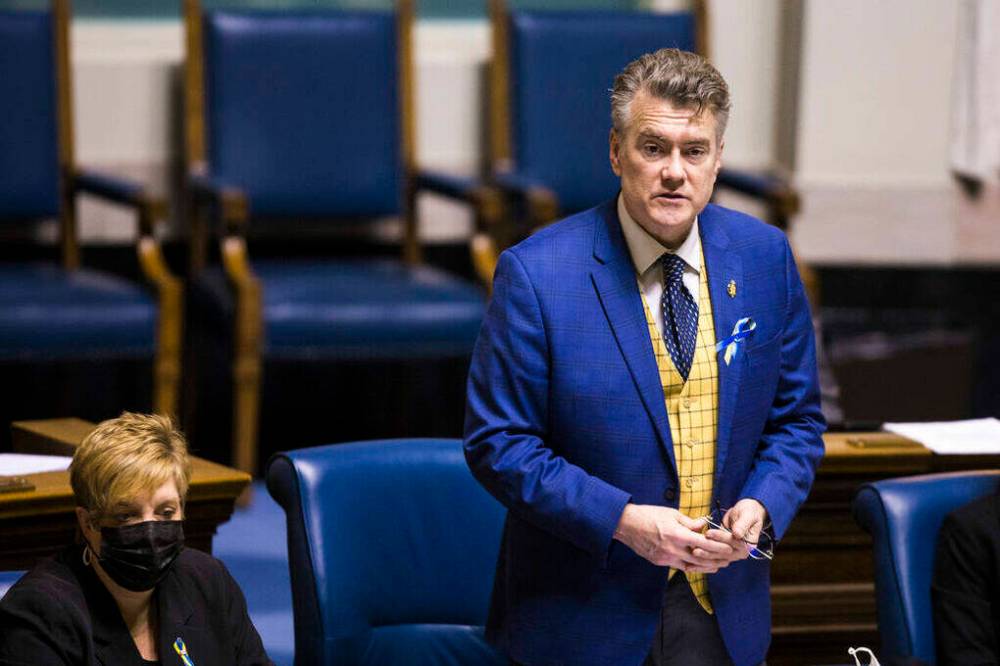Manitoba eyes non-disclosure agreements bill
Advertisement
Read this article for free:
or
Already have an account? Log in here »
To continue reading, please subscribe:
Monthly Digital Subscription
$0 for the first 4 weeks*
- Enjoy unlimited reading on winnipegfreepress.com
- Read the E-Edition, our digital replica newspaper
- Access News Break, our award-winning app
- Play interactive puzzles
*No charge for 4 weeks then price increases to the regular rate of $19.00 plus GST every four weeks. Offer available to new and qualified returning subscribers only. Cancel any time.
Monthly Digital Subscription
$4.75/week*
- Enjoy unlimited reading on winnipegfreepress.com
- Read the E-Edition, our digital replica newspaper
- Access News Break, our award-winning app
- Play interactive puzzles
*Billed as $19 plus GST every four weeks. Cancel any time.
To continue reading, please subscribe:
Add Free Press access to your Brandon Sun subscription for only an additional
$1 for the first 4 weeks*
*Your next subscription payment will increase by $1.00 and you will be charged $16.99 plus GST for four weeks. After four weeks, your payment will increase to $23.99 plus GST every four weeks.
Read unlimited articles for free today:
or
Already have an account? Log in here »
Hey there, time traveller!
This article was published 07/10/2022 (1160 days ago), so information in it may no longer be current.
The Manitoba legislature is set to vote Tuesday on a private member’s bill to restrict the use of non-disclosure agreements in cases of discrimination or harassment.
Bill 225 (Non-Disclosure Agreements Act) is intended to stop NDAs from being used to protect predators and those who employ or represent them, said Liberal Leader Dougald Lamont.
“It’s an issue — both with bad things being covered up and it’s used to silence and punish people who’ve spoken up, including whistle blowers,” the MLA for St. Boniface said Friday. “An individual can keep offending because every new victim thinks they’re the only one.”

Winnipeg Free Press Files
Manitoba Liberal Leader Dougald Lamont on Bill 225 (Non-Disclosure Agreements Act): “Nobody would be able to sign one that forces people to be silent about sexual harassment, sexual assault, intimidation.”
The bill is modelled on Prince Edward Island’s Non-Disclosure Agreements Act, which came into force in May. Its stated purpose is “to regulate the content and use of non-disclosure agreements.”
The East Coast province became the first jurisdiction in Canada to limit the use of non-disclosure clauses in settlement agreements. It stipulates in cases of discrimination or harassment, including sexual misconduct, a non-disclosure agreement can only be part of a settlement if the person bringing forward the allegation wants it there.
People who have signed NDAs may struggle because they cannot speak with family or friends about what they have experienced or witnessed, said Lamont. While they can go to the police, they may be afraid to, he added.
The proposed Manitoba legislation would make a non-disclosure agreement unenforceable unless it complies with the following requirements: it must have been the expressed wish and desire of the complainant; the complainant had an opportunity to receive legal advice; there were no undue attempts to influence the complainant to enter into the agreement; it does not adversely affect the public interest; it provides a process for the complainant to waive their own confidentiality; and it has a set duration.
“It would mean that nobody would be able to sign one that forces people to be silent about sexual harassment, sexual assault, intimidation,” said Lamont.
He pointed to the case involving former University of Manitoba music professor Steve Kirby, who was accused of sexual misconduct against students. The university was ordered to pay $286,000 to Kirby, after a grievance was filed by the University of Manitoba Faculty Association on his behalf in November 2017 and an arbitrator found the school had breached the professor’s privacy.
The jazz instructor left the school in 2017, after an internal investigation report found he repeatedly made inappropriate sexual comments and unwanted sexual contact with a female student.
“We know that it happens in education, in health care, Hockey Canada — all these places where you have really terrible things that are being swept under the rug that are in the public interest,” Lamont said. “It gets covered up and all the money that’s being paid out is public money.”
With a Progressive Conservative majority, private member’s bills introduced by the opposition rarely become law. The Liberals have just three votes in the house, but Lamont said this bill stands a chance of getting passed based on its non-partisan merit.
A spokesman for the PC caucus didn’t disagree.
“PC MLAs will consider the bill in the legislature, ask questions, and debate it as they do with all private member’s legislation,” the spokesman said Friday.
carol.sanders@freepress.mb.ca

Our newsroom depends on a growing audience of readers to power our journalism. If you are not a paid reader, please consider becoming a subscriber.
Our newsroom depends on its audience of readers to power our journalism. Thank you for your support.

